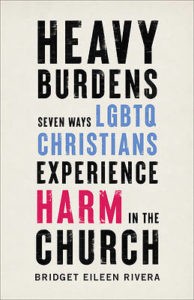I squirmed in my seat, avoiding eye contact with the women in my small group. They offered encouragement to a woman sitting next to me. She spoke in halting sentences, wiping away tears with a tissue they offered.
“It’s just awful,” she said. “You can’t even imagine.”
But I could.
She was talking about her son. Her gay son. And nobody knew that he was gay but me and her. She didn’t even know that I knew. She didn’t know that I knew he had a boyfriend. That he had just come out to her a day ago. She didn’t know that I knew about it all.

Bridget Eileen Rivera
She didn’t know that I am gay too. None of them did.
“Pete just needs prayer,” she said. “We learned some things about him yesterday. I can’t go into details, but he’s falling away.”
I fingered the pages of my Bible nervously and found myself saying, “Your son loves Jesus … . He really does. God will watch out for him.”
“This is just so terrible, Bridget,” she said, eyes bleary and red. “I can’t say what it is, but it’s just so bad that I’d rather have learned he was dead.”
I’d rather have learned he was dead.
Her words lingered in the air as I looked away. One of the ladies gave her hand a little squeeze, and the mother went on about her family’s despair. A woman volunteered to pray for her. And then we moved on.
What is so bad about homosexuality that a Christian would rather a loved one be dead than gay? I’ve asked myself that question more times than I can count. Although her sentiment is shocking, the woman from my small group isn’t an outlier. Her words reflect the secret and often unconscious thoughts of many Christians. Worse, her words reflect the silent voice of death whispering in the minds of countless LGBTQ people — people made in the image of God who often tragically believe they’d be better off dead than alive as they are.
“Discrimination never starts with a death wish.”
The question is why?
Discrimination never starts with a death wish. It begins slowly. Imperceptibly. Lurking in a raised eyebrow and in the unspoken assumptions we make about normalcy. It flourishes in the hopes and dreams we nurture for ourselves and for our loved ones and in the prejudices we cultivate for those we despise. Until one day a parent wakes up and finds themself shedding more tears over their child being gay than being dead.
Until one day a child wakes up and actually wants to be dead.
Come to me, all who labor and are heavy laden, and I will give you rest. Take my yoke upon you, and learn from me, for I am gentle and lowly in heart, and you will find rest for your souls. For my yoke is easy, and my burden is light. (Matthew 11:28–30)
One of the greatest invitations of the gospel is an invitation to rest. Jesus not only brings life to his children. He brings a good life. Not a life without troubles, for sure, but one with troubles that are nevertheless easy. As he declared in the passage above, he brings a life with burdens that are light.
Objections abound to such a notion, even from Christians. What about taking up your cross to follow Jesus? Counting the cost? Dying to yourself and mortifying the flesh? Isn’t the call to follow Jesus a call to share in his suffering?
And the answer is yes! But in our haste to emphasize the cost of following Jesus, we must not forget the blessing. According to Scripture, the burdens of Christ bring peace to our souls, not misery. “Take my yoke upon you,” Jesus said, “and you will find rest for your souls.”
“In our haste to emphasize the cost of following Jesus, we must not forget the blessing.”
Anyone who has ever done something good for the sake of doing something good knows what I’m talking about. There’s a difference between giving your only slice of cake to your brother because you want to do something nice and your brother stealing that piece of cake. You “suffer” the loss of cake in both situations. But the first scenario makes you happy to see your brother enjoying your cake. The second just makes you angry.
Suffering for the sake of Christ is much the same. Christ calls each of us into a type of suffering that brings joy even in the midst of loss, a paradoxical burden that makes our journey easier, not harder. A mysteriously better way to enjoy our cake by giving it up. A way to live our life by losing it.
“The law of the Lord is perfect, reviving the soul,” the psalmist declares. “The precepts of the Lord are right, rejoicing the heart” (Psalm 19:7a, 8a). If one thing is certain about following Jesus, it’s that following him is good for us. It revives us in the deserts of this world and makes our hearts “rejoice with joy that is inexpressible and filled with glory” (1 Peter 1:8). The law of the Lord is “sweeter also than honey and drippings of the honeycomb” (Psalm 19:10) because it’s not only objectively good but subjectively good too. It “tastes” good to follow God. His burdens feel light. In a world weighed down by sin, shame and oppression, Jesus Christ delivers us from the weight of our present darkness.
It should come as no surprise, then, that Jesus pronounces anathema upon the religious leaders of his day, hypocrites who loaded the people of God with heavy burdens: “And (Jesus) said, ‘Woe to you lawyers also! For you load people with burdens hard to bear, and you yourselves do not touch the burdens with one of your fingers. Woe to you!’” (Luke 11:46–47).
“Countless LGBTQ believers find themselves struggling under the weight of burdens that no Christian should ever bear.”
Indeed, heavy burdens pervert the very message of the gospel. Imagine walking with Christian in John Bunyan’s The Pilgrim’s Progress. You arrive at the cross, and Christian’s burden slips from his back. But just as he’s about to rejoice, a stranger suddenly appears with an even greater burden. He hoists it upon Christian’s shoulders, replacing what Christ had taken away, and declares that Christian must journey all the way to the Celestial City like that. How far would Christian get?
Countless LGBTQ believers find themselves struggling under the weight of burdens that no Christian should ever bear, burdens given to them not by Christ but by stigma, prejudice and discrimination. They faithfully persevere in their journey to the Celestial City with a heroic degree of faithfulness, but they do so under the mounting pressure of an atmosphere hostile to their faith. What’s worse, many sexual and gender minorities leave the faith altogether, their belief destroyed in the wake of abhorrent abuses that would test the resolve of the greatest of saints. Few Christians understand the extent of the problem, and even fewer are ready to acknowledge that Christian communities are responsible.
 Bridget Eileen Rivera writes and speaks on faith, sexuality and justice. Her website, Meditations of a Traveling Nun, is a leading resource on gay celibacy, attracting thousands of unique visitors every month. She has worked with a number of faith-based organizations, including Revoice, Christians for Social Action, and Preston Sprinkle’s Center for Faith, Sexuality & Gender, where she contributed to the Digital Leaders Forum. Rivera is currently pursuing her Ph.D. in sociology from the City University of New York Graduate Center. Follow her on social media at @travelingnun. This article is excerpted from her new book, Heavy Burdens ©2021. Used by permission of Baker Publishing.
Bridget Eileen Rivera writes and speaks on faith, sexuality and justice. Her website, Meditations of a Traveling Nun, is a leading resource on gay celibacy, attracting thousands of unique visitors every month. She has worked with a number of faith-based organizations, including Revoice, Christians for Social Action, and Preston Sprinkle’s Center for Faith, Sexuality & Gender, where she contributed to the Digital Leaders Forum. Rivera is currently pursuing her Ph.D. in sociology from the City University of New York Graduate Center. Follow her on social media at @travelingnun. This article is excerpted from her new book, Heavy Burdens ©2021. Used by permission of Baker Publishing.
Related articles:
Couple helps parents of LGBTQ kids come out of the closet
God says it: You are good enough | Opinion by Amber Cantorna


